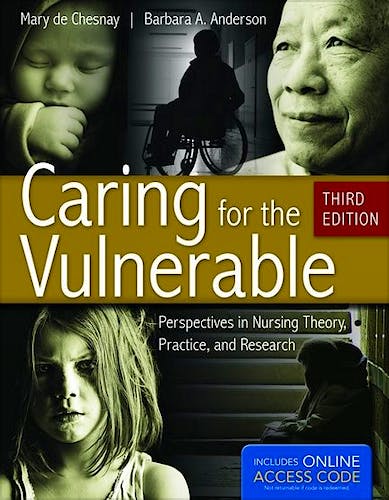

No hay productos en el carrito



Caring for the Vulnerable. Perspectives in Nursing Theory, Practice, and Research
de Chesnay, M. — Anderson, B.
3ª Edición Noviembre 2011
Inglés
594 pags
2000 gr
null x null x null cm
ISBN 9781449635923
Editorial JONES AND BARTLETT
LIBRO IMPRESO
-5%
60,70 €57,67 €IVA incluido
58,37 €55,45 €IVA no incluido
Recíbelo en un plazo de
2 - 3 semanas
Description
Within an expanding field of study in both undergraduate and graduate nursing curricula, Caring for the Vulnerable: Perspectives in Nursing Theory, Practice, and Research, Third Edition explores vulnerability from the perspective of individuals, groups, communities, and populations while addressing how vulnerability affects nurses, nursing, and nursing care. This new edition presents a basic structure for caring for the vulnerable with the ultimate goal of providing culturally competent care, and includes a fantastic Companion Website with learning tools and resources for students.
Theoretical and research chapters progress towards others offering meaningful learning experiences for both nursing students and practitioners. Further, since nurses are the crucial link between those who are vulnerable and those with access to solutions, this text provides ideas for how nurses might advocate for the vulnerable on a policy level. Written specifically for nurses by nurses, Caring for the Vulnerable: Perspectives in Nursing Theory, Practice, and Research, Third Edition is a timely and necessary response to the culturally diverse, vulnerable populations for whom nurses must provide appropriate and precise care.
12 New Chapters:
- Advocacy: Role of Providers
- Theories of “Mothering” in HIV-Infected Mothers
- Using Self-Efficacy Theory to Help Vulnerable Women Breastfeed
- Sample Qualitative Research Proposal: Childhood Obesity in Latino Families
- Sample Quantitative Research Proposal: Effect of Video-Based Education on Knowledge and Perceptionsof Risk for Breast Cancer Genes BRCA-1 and BRCA-2 in Urban Latino Populations
- Life Histories: Affluent Adolescents and Substance Abuse
- Mobile Clinics as Outreach to the Underserved
- “Staying with HIV/AIDS: A Compressed Ethnography of Zambian Women"
- Health Systems and Human Resources for Health: New Dimensions in Global Health Nursing
- Navy Nurses: Vulnerable People Caring for Vulnerable Populations
- Ethics of End-of-Life Care
- The "SamfieMan" Revisited
Table of Contents
Unit 1 Concepts
Chapter 1 Vulnerable Populations: Vulnerable People
Chapter 2 Advocacy: Role of Providers
Chapter 3 Cultural Competence and Resilience
Chapter 4 Social Justice in Nursing: A Review of the Literature
Chapter 5 Low Literacy and Vulnerable Clients
Unit 2 Nursing Theories
Chapter 6 Nursing Theories Applied to Vulnerable Populations: Examples from
Turkey
Chapter 7 Culturally Competent Care for South Pacific Islanders
Chapter 8 Theories of “Mothering” in HIV-Infected Mothers
Chapter 9 Giving Voice to Vulnerable Populations: Rogerian Theory
Chapter 10 Application of the Barnard Parent/Caregiver-Child Interaction Model
to Care of Premature Infants
Chapter 11 The Utility of Leininger’s Culture Care Theory with Vulnerable
Populations
Chapter 12 Positive Skills, Positive Strategies: Solution-Focused Nursing
Chapter 13 Using Self-Efficacy Theory to Help Vulnerable Women Breastfeed
Unit 3 Research
Chapter 14 Research with Vulnerable Populations: Methods and Ethical Issues
Chapter 15 Sample Qualitative Research Proposal: Childhood Obesity in Latino
Families
Chapter 16 Sample Quantitative Research Proposal: Effect of Video-Based Education
on Knowledge and Perceptions of Risk for Breast Cancer Genes BRCA-1 and BRCA-2
in Urban Latino Populations
Chapter 17 Mobile Clinics as Outreach to the Underserved
Chapter 18 Life Histories: Affluent Adolescents and Substance Abuse
Chapter 19 “Staying with HIV/AIDS: A Compressed Ethnography of Zambian
Women"
Chapter 20 Health Systems and Human Resources for Health: New Dimensions in
Global Health Nursing
Chapter 21 The Use of Community-Based Participatory Research to Understand and
Work with Vulnerable Populations
Chapter 22 Immigrant Vulnerability: Does Capitalism in the United States Matter?
Unit 4 Practice
Chapter 23 Predisposition to Non-Insulin Dependent Diabetes Mellitus among Immigrants
from the Former Soviet Union
Chapter 24 Barriers to Healthcare Access for Latino Service Workers in a Resort
Community
Chapter 25 Navy Nurses: Vulnerable People Caring for Vulnerable Populations
Chapter 26 Ethics of End-of-Life Care
Chapter 27 The "SamfieMan" Revisited
Unit 5 Programs
Chapter 28 Program Development for Vulnerable Populations
Chapter 29 Dartmouth Center for Childhood Autism: A Nurse-Led Initiative for
Reaching Vulnerable Children and Their Families
Chapter 30 Developing a Nurse-Practitioner Run Center for Residents in Rural
Appalachia
Chapter 31 Strategies for Working with Individuals with Fetal Alcohol Spectrum
Disorders: Lessons Learned in Alaska
Unit 6 Teaching-Learning
Chapter 32 Teaching Nurses about Vulnerable Populations
Chapter 33 Health Communities and Vulnerability: Enhancing Curricula for Teaching
Population Based Nursing
Chapter 34 Preparing Nursing Professionals to be Advocates: Service Learning
Chapter 35 Working with Graduate Students to Develop Cultural Competence
Chapter 36 Assessing the Needs of the Homeless in Townsville, USA
Chapter 37 Designing and Implementing a Cultural Competence Education Model
of School Nurses: Working with African American Children and Families
Chapter 38 Clinical Immersion in Family Nursing Practice in Lac du Flambeau
Unit 7 Policy Implications
Chapter 39 Public Policy and Vulnerable Populations
Chapter 40 Advancing Health Care Policy through the Use of the Political Narrative
to Give Voice to a Vulnerable Population
Chapter 41 Health Policy and Advocacy for Vulnerable Populations
Chapter 42 The Nursing Workforce Shortage: The Vulnerability of the Health Care
System
About the Author(s)
Mary de Chesnay, DSN, PMHCNS-BC, FAAN-Professor, WellStar School of Nursing, Kennesaw State University, Kennesaw, Georgia
Mary de Chesnay, DSN, PMHCNS-BC, FAAN is the former Director of the WellStar School of Nursing and Interim Director of the KSU Community Clinic Program at Kennesaw State University. A family therapist since 1973, she is an applied anthropologist currently studying resilience and success at overcoming trauma, major illness or disaster.
Barbara A. Anderson, DrPH, CNM, FACNM, FAAN-Director, Doctor of Nursing Practice, Frontier Nursing University, Hyden, Kentucky
Barbara A. Anderson, DrPH, CNM, FACNM, FAAN, is the director of the DNP program at the Frontier Nursing University. Her current research focuses on vulnerability as it relates to the nursing workforce shortage in both the U.S. and in developing nations.
© 2025 Axón Librería S.L.
2.149.0